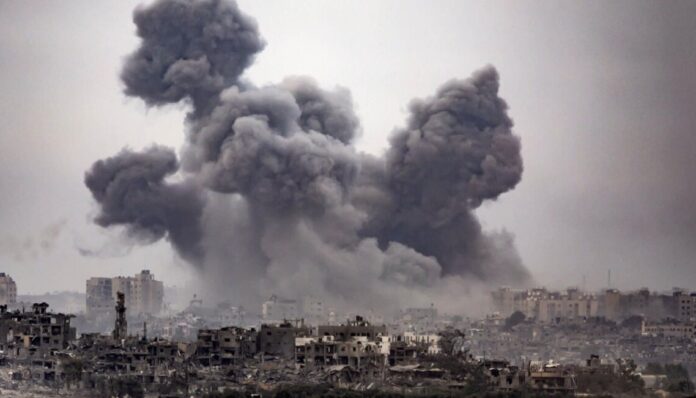Opposition leader Benny Ganz, who joined the military office of Israel after Hamas attacks on October 7, emphasized the determination of the country and its Western allies in connection with further actions against Iran.
"Israel will respond in the right manner and at the appropriate time we will choose. This is an important step for our national security, and we have to support this strategic course," the politician said. "Confrontation with Iran is a confrontation with the world with Iran. It is an achievement that requires our attention and mobilization to ensure the security of Israel."
The words used by Mr. Ganc do not exclude the possibility of another attack on Iranian purposes or the first open strike of Israel against Iran. Israel has already repeatedly attacked the nuclear program of Iran, carried out cyberattacks and killed officials and scientists. However, it may be possible to find a diplomatic response that President Joe Biden wants to discuss at the G7 meeting he convened to the richest Western countries.
The last escalation of the conflict in the Middle East, triggered by Hamas attack on Israel, began two weeks ago when Israel attacked the Iran's embassy in Damascus. On April 1, a high -ranking General Mohammad Reza Zageda and five members of the Corps of the Guardians of the Islamic Revolution were killed on April 1.
The decision on the attack was not agreed with the Americans. Israel probably considered the possibility of destroying the senior commanders of the Corps of the Guards of the Islamic Revolution of Iran as a risk to go.
Publicly, Israel makes unconvincing arguments that the presence of senior military officers in diplomatic premises made the building a legitimate target. But more important is the fact that Iran has decided to interpret the Air Force as an attack on his own territory.
It became clear that Iran would answer. The message of Iran was transmitted not only in hints, but also in the unambiguous statements of his supreme leader, Ayatola Ali Khamenei.
Israel, along with the US and their allies, has received numerous warnings about a possible threat. After visiting his native state Delaware on the weekend, President Biden returned to the White House.
Iran decided to start an attack not using supersonic ballistic missiles, but from slow drones, which within two hours were displayed on radars while approaching the purposes.
This attack was greater than many analysts expected who followed the actions of the worst enemy of Israel. This encourages many Israelites to expect a response for their part.
For the first time, Iran launched about 300 drones, winged and ballistic missiles into the territory of Israel from its territory. Most of them were shot down by powerful air defense. The United States, the United Kingdom and Jordan were able to support Israel at this important time, especially during the night. President Biden has confirmed his promise to give the "iron" security of Israel, which in fact means: "We are standing for you."
Instead, Americans urge Israel to restraint. Biden President sent a clear message to the Prime Minister of Netanyha: Iran's attack was thwarted, Israel won the victory, so do not sharpen the situation by answering military strikes in the Iranian territory. A high -ranking Western diplomat noted that it is currently vital to set a limit to prevent further escalation.
Iran seems to hope for it. He signals that the response to the Israeli blow to Damascus is ready, and further escalation is possible only in the event of a new blow from Israel.
Iranians seem to be striving to reduce tension after a two -week crisis and threats provoked by the Israeli blow to their diplomatic complex in Damascus.
Iran may have hoped to do more harm than it was possible. Or he spoke openly about his plans for the attack on Israel to have fewer grounds for answer.
Iran would like to return to the restraint policy that existed in the Israeli blow on the complex in Damascus. However, this may be difficult after Israel and his allies have knocked out almost all the shells launched by Iran in their direction.
This attack on Israel was not full -scale. Iran has increased its missile capacity over the years and could use much more weapons. Hezbolla in Lebanon could also join the attack, but this did not happen. This organization, which is the strongest ally of Iran with arsenal of rockets and shells, remained aside.
Netanyahu Prime Minister can be satisfied that Iran's attack has taken gas from the first pages of the media. This gives him a break from the humanitarian crisis and the inability to achieve Israel's military goals in the context of hostages and the defeat of Hamas.
Only a few days ago, international attention was drawn to the differences between Biden and Netanyhah through the famine caused by the Israeli blockade of Gaza. Now we are talking about unity. Netanyhah can also position himself as a decisive and intelligent leader, the defender of his people, even though his numerous enemies in Israel seek to remove him from power. They claim that his ill -advised, dangerous policy, until October 7, forced Hamas to believe that Israel was vulnerable.
However, what remains unchanged is the desire of Americans to find a way to prevent exacerbation of war in the region. The crossing of many red lines is the attack of Israel on a diplomatic object and a direct attack by Iran on Israel. Some right wings in Israel are already demanding answers. These calls will not subside.
The task of G7 diplomats is to find ways to prevent relationships in the region to achieve more destruction. A slow but stable descent into the disaster occurred throughout the six months after Hamas attack on Israel.
If Israel listens to the advice of President Baiden and does not respond with a blow, the Middle East can breathe with relief. However, there are no guarantees that this dangerous episode will end.


